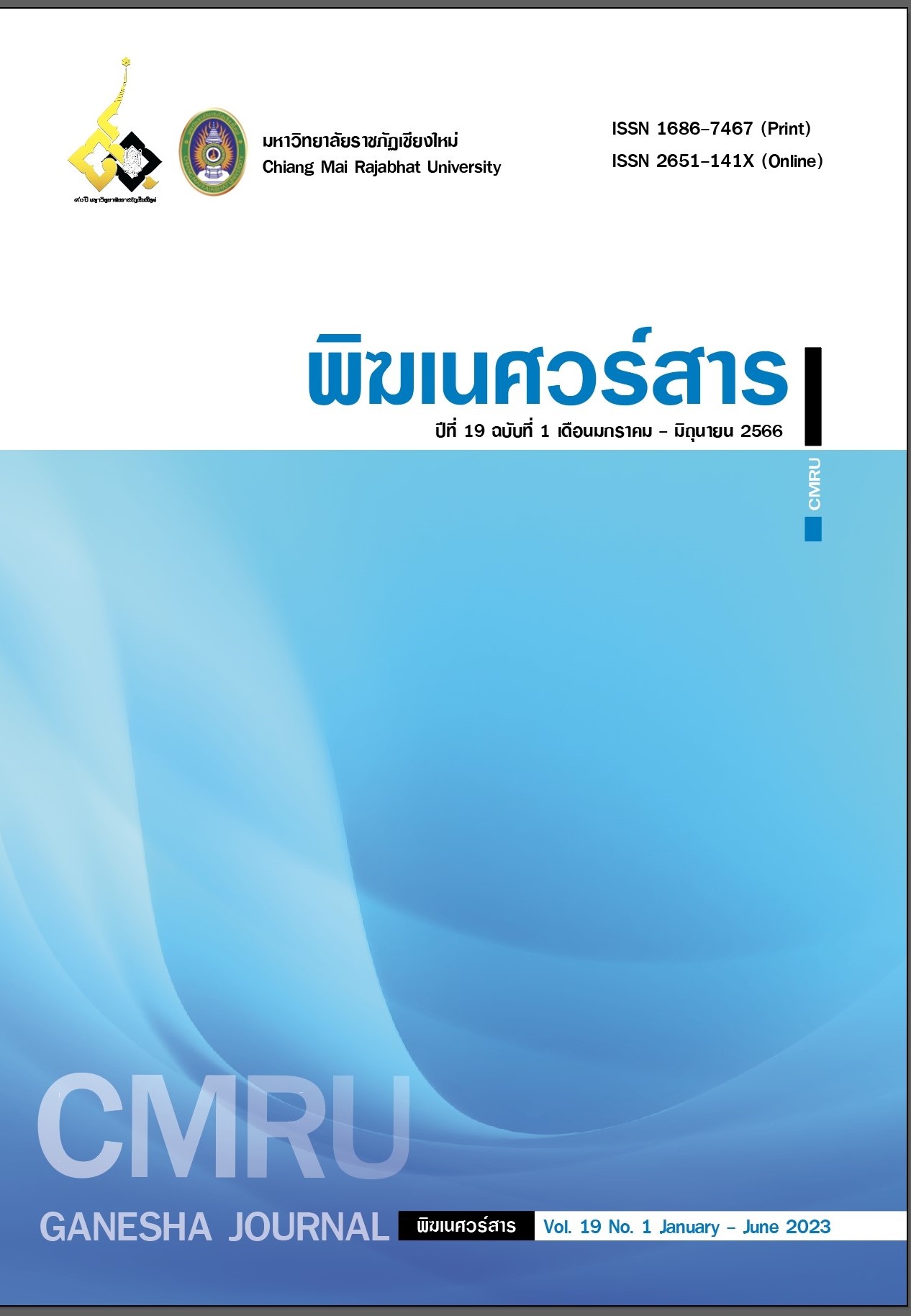Sappurisa Dhamma 7 Presented in Walt Disney’S Animated Movie Encanto
Main Article Content
Abstract
Animated movies have gained popularity among viewers of all ages thanks to their inventiveness and use of techniques. Additionally, it reflects many interesting parts of entertainment and education that considers many different opinions, particularly the consideration of Buddhist principles. Encanto is a Walt Disney’s animated movie that represents Seven Sappurisa Dhamma through the characters. This study aims to study the Buddhist principles called Seven Sappurisa Dhamma through the characters in Encanto. In terms of Buddhism, Sappurisa Dhamma means the principle of a good man which consists of Dhammaññutā (knowledge of the cause), Atthaññutā (knowledge of meaning or purposes), Attaññutā (knowledge of self), Mattaññutā (knowledge how to be temperate), Kālaññutā (knowledge to choose and keep time), Parisaññatā (knowledge of society), and Puggalaññutā (knowledge of groups of people). The study found that all characters reflected the use of Seven Sappurisa Dhamma through conversation, action and situations. In summary, even though the animated movie Encanto is a foreign movie, it still represents the significant points from the use of Buddhist principles into media or other resources to enhance the use of morals and values.
Downloads
Article Details

This work is licensed under a Creative Commons Attribution-NonCommercial-NoDerivatives 4.0 International License.
The articles published are copyrighted by the Graduate School, Chiang Mai Rajabhat University.
The opinions expressed in each article of this academic journal are solely those of the individual authors and do not reflect the views of Chiang Mai Rajabhat University or its faculty members. The responsibility for the content of each article rests entirely with the respective authors. In the event of any errors, the authors alone are responsible for their own articles.
References
Bhatti, Z., Shah, A., Waqas, A., & Mahmood, N. (2015). Analysis for design principles and requirements for procedural rigging of Bipeds and Quadrupeds characters with custom manipulators for animation. International Journal of Computer Graphics & Animation (IJCGA), 5(1), 47-67. DOI: 10.5121/ijcga.2015.5104 47
Banlue, A. (2016). Suppurisa Dhamma of administrators and organizational intelligence of school under the Secondary Educational Service Area Office 8. (Master Thesis, Silpakorn University).
Buswell, R. E. (2004). Encyclopedia of Buddhism. New York: Macmillan.
Chanapaiboon, U. (2012). Sappurisa Dhamma: The principle of public service. Ramkhamhaeng University Journal Humanities Edition, 31(1), 1-13).
Chaopo, T. (2022). Sappurisa-Dhamma based leadership of Mahamakut Buddhist University Sirlanchang Campus students. Srilangchang Research Journal, 2(4), 57-65.
Chia, J. M. T. (2009). Teaching Dharma, grooming Sangha: The Buddhist College of Singapore. SOJOURN: Journal of Social Issues in Southeast Asia, 24(1), 122–138.
Dangfai, P., Poonpipat, N. & Ponmanee, S. (2019). The Lord Buddha Dharma and writing style in the column “Jud Fai Nai Jai Khon” by Laug Pee Nam Fon. Genesha Journal, 15(2), 45-53.
Diaz, S. M. (2021). Review: ‘Encanto’. Retrieved from https://film-cred.com/review-encanto-disney-animated-musical-colombia/
Khamsook, P. L., Prachanban, P., & Pansri, O. (2015). The development of Seven Sappurisadham learning package to promote sufficiency economy lifestyle for Prathom 5 student. The Golden Teak: Humanity and Social Science Journal, 21(1), 133-144.
Khaleghipour, M., & Shahahasemi, E. (2020). Fantasy animations and children’s imagination: A qualitative study. In 2nd International Conference on Future of Social Sciences and Humanities, 4-6 September, 2020, Prague, Czech, pp. 62-79.
Macdonald, S. (2015). Amination as intertextual Cinmea: Nezha Naohai (Nezha Conquers the Dragon King). Animation: An Interdisciplinary Journal, 10(3), 205-221. DOI: 10.1177/1746847715605608
Merino, Y., & Spencer, C. (Producers), Bush, J., & Howard, B. (Directors). (2021). Encanto [Motion picture].
United States; Walt Disney Studios Motion Pictures.
Mukdaprasert, K., & Chalauisaeng, B. (2021). Cultivating wisdom, morality and happiness in Thai secondary school students by implementing the novel transforming learning taxonomy. Journal of Mekong Societies, 17(2), 99-120.
Khippapanyao, P. (2005). Sappurisa Dhmma. Bangkok: Por Samphan Printing Services. [In Thai].
Payutto, P.A. (2007). A constitution for living: Buddhist principles for a fruitful and harmonious life. Bruce Evans (Trans). Kandy: Buddhist Publication Inc.
Papassaro, P., & Manmee, T. (2018). The Sappurisa Dhmma theory self management. Journal of MCU Alumni Association, 7(2), 69-76.
Panyavachiro, C., Kantadhammo, P. K., Titiyano, P.P., & Joomkhrong, P. (2020). An analytical study of Buddha Dhamma found in Nang Pramothai Isan-shadow play: A case study in Sisaket province. Journal of MCU Ubon Review, 5(1), 108-123.
Phokam, P. P. T. (2021). An educational institution administration in the digital period in accordance with the principle of Sappurisa-Dhamma 7 in Phrapariyattidhamma School, Formal Education Section of Wat Srinakararam in Kumpawapi District, Udonthani Province. Journal of Modern Learning Development, 6(4), 297-314.
Phratheppatcharayanumunee (Chayasaro Phikku). (2020). Panyajai 2. Bangkok: Aksorn Sampan Press (1987) Co., Ltd. [In Thai].
Pikkov, Ü. (2010). Animasophy theoretical writings on the Animated Film. Estonia: Estanian Academy of Arts.
Prathoomthin, A., Anansiriwat, P., & Panchan, P. (2018). An analyze of the use of figurative language to convey the Buddhist teaching on the development of mediation by Praratchaphromyaan. Mangraisaan Journal, 6(2), 17-26.
Promarach, P. T., Manmee, T., & Suklueng, K. (2018). The principle of Sappurisadhamma on the correction of social problems. Journal of MCU Alumni Association, 6(1), 51-65.
Ratelle, A. (2017). João Paulo Amaral Schlittler – animation as a transmedia interface. Animation Studies Online Journal, 12, 1-10.
Tanakittikasame, P. (2019). Reflection of Karma through a tale of Phayao Kan Kak. Lanna Journal of Buddhist Studies and Cultures, 1(1), 120-139.
Turoff, N. (2022). “Encanto,” a spoiler-filled movie review. Retrieved from https://unfspinnaker.com/95551/
features/encanto-a-spoiler-filled-movie-and-soundtrack-review/
Yavaprabhas, K. (2022). Creating “good” Thai citizens: Religious in Thai textbooks. Journal of Mekong Societies, 18(2), 105-124.


